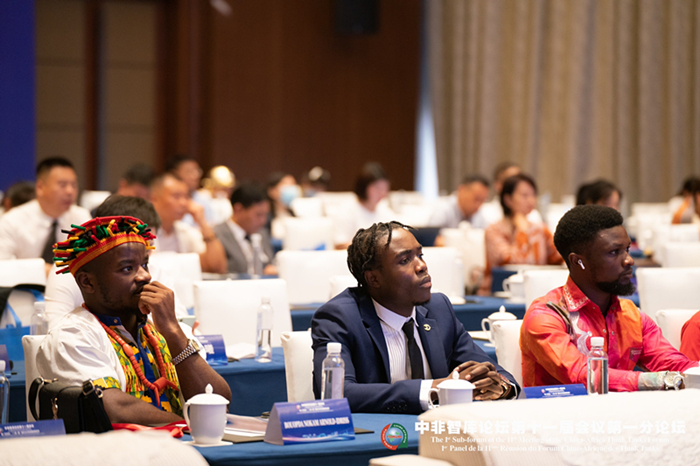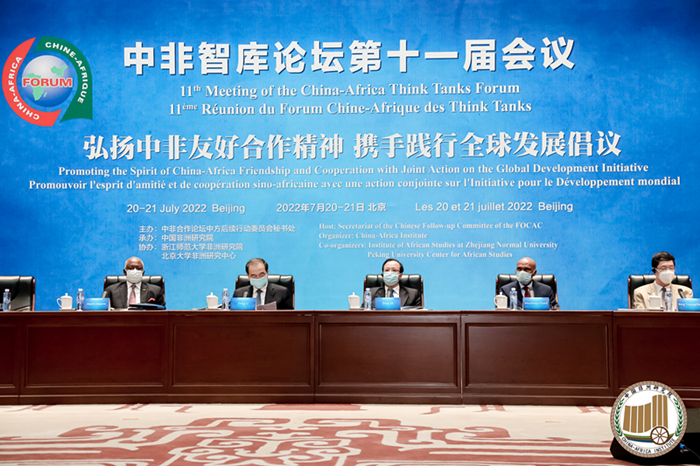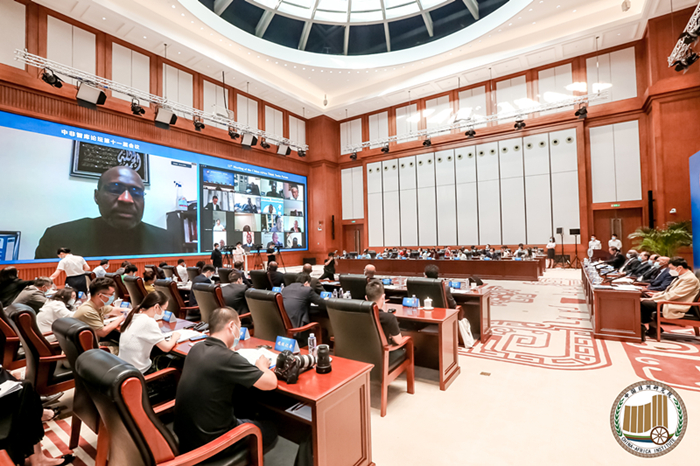|
||||||||||
| Home Nation World Business Opinion Lifestyle ChinAfrica Multimedia Columnists Documents Special Reports |
|
||||||||||
| Home Nation World Business Opinion Lifestyle ChinAfrica Multimedia Columnists Documents Special Reports |
| ChinAfrica |
| Driven by Knowledge |
| Think tanks offer ideas contributing to improving communication and mutual understanding, and enhancing cooperation between China and Africa |
| By Xia Yuanyuan 丨VOL. 14 September 2022 ·2022-08-29 |

Attendees of a sub-forum of the 11th Meeting of the China-Africa Think Tanks Forum held in Jinhua, Zhejiang Province, on July 21
More than 200 attendees including officials and scholars from China and Africa participated in the 11th Meeting of the China-Africa Think Tanks Forum (CATTF), held both online and offline from July 20 to 21, to enhance the deep understanding between the two sides.
Recalling the original intent behind the establishment of the CATTF, Liu Hongwu, Director of the Institute of African Studies at Zhejiang Normal University and one of the initiators of the forum, hoped the forum would work as a bridge to bring together Chinese and African think tanks, so as to share insights on future strategies.
“Through candid dialogue, think tanks can review the past, discuss current challenges and offer solutions, so as to enable more people to benefit from China-Africa cooperation,” said Liu.
After 11 years of development since its establishment in 2011, the forum has become a special platform for think tanks from China and African countries to build consensus and come up with innovative ideas that can be translated into policies and mechanisms. “Now it is a vivid epitome of the robust people-to-people exchanges and cultural communication between China and Africa,” said Liu.
Deeper understanding
In 2009, at the Fourth Ministerial Conference of the Forum on China-Africa Cooperation (FOCAC) held in Egypt, then Chinese Premier Wen Jiabao announced eight measures the Chinese Government would take to strengthen China-Africa cooperation. Strengthening of think tank exchanges was proposed for the first time. The plan stipulated the launch of a China-Africa joint research and exchange program to enable scholars and think tanks to have more exchanges and share development experience, and provide intellectual input for formulating better cooperation policies.
The China-Africa Joint Research and Exchange Plan was launched in 2010 by the Chinese Government to explore ways of mutually beneficial cooperation, promote extensive exchanges on humanities, and push the international community to increase attention to and support for Africa. More than 80 think tanks and academic research institutions have participated in the plan, according to a white paper titled China and Africa in the New Era: A Partnership of Equals released by China’s State Council Information Office in 2021.
In 2011, the First CATTF was held by the Institute of African Studies of Zhejiang Normal University in east China’s Zhejiang Province. In 2012, the forum became a part of FOCAC.
The Fifth Ministerial Conference of FOCAC held in 2012 proposed the China-Africa Think Tanks 10+10 Partnership Plan, which, when fully-implemented, would include 10 Chinese think tanks and 10 African think tanks for long-term paired cooperation and exchanges. In 2015, the FOCAC Johannesburg Summit announced 10 cooperation plans, and promoting the exchange and cooperation between think tanks and scholars from both sides became the focus of people-to-people exchanges.
In April 2019, the China-Africa Institute was established in Beijing. The establishment of the institute reflects the growing expectations and demand for closer cooperation between Chinese and African think tanks.
The Eighth FOCAC Ministerial Conference was held in Dakar, Senegal, in 2021, which adopted the FOCAC Dakar Action Plan (2022-24). It stipulates that China will further increase support to help African universities and think tanks hold seminars and carry out research projects, continue to implement the China-Africa University 20+20 Cooperation Plan nd the China-Africa Think Tank 10+10 Partnership Plan, and strengthen joint research and exchanges between Chinese and African think tanks.

The opening ceremony of the 11th Meeting of the China-Africa Think Tanks Forum is held in Beijing both online and offine from July 20 to 21
Intellectual support
Barriers such as language differences, prejudices and misunderstandings between the Chinese and African people still exist, said Liu Haifang, Director of the Center for African Studies at Peking University. “Think tanks should play a leading role in enhancing exchanges to build the foundation for mutual understanding,” Liu told ChinAfrica.
Zhang Chunyu, a research fellow at the China-Africa Institute of the Chinese Academy of Social Sciences, believes that there should be both official and unofficial channels for exchanges between China and Africa, and think tanks should play an important role in nongovernmental channel.
“Think tanks understand policies, have foresight and knowledge reserves, and their communication could lay the groundwork for in-depth exchanges between Chinese and African governments,” Zhang told ChinAfrica. Besides, as a key component of people-to-people exchanges, think tank exchanges could eliminate misconceptions and improve mutual understanding.
Zhang Zhongxiang, Deputy Director of the Center for African Studies at Shanghai Normal University, said the CATTF promotes Sino-African people-to-people exchanges, which makes cooperation in other areas more sustainable. “It also provides a good opportunity for scholars to discuss problems in Sino-African cooperation and work together to find possible solutions. African scholars can also better understand China’s policy toward Africa through the exchanges,” Zhang told ChinAfrica.
Charles Onunaiju, Director of the Center for China Studies in Abuja, Nigeria, writes in his book China’s Struggle for Modernization: From Revolution to Reform that the CATTF concept promoted by China offers an alternative perspective to the Western narrative on global development. He said that think tanks are providing the intellectual framework to drive the policy of further cooperation between China and Africa. Think tank exchanges not only provide intellectual support, but they drive it.
Liu Hongwu of Zhejiang Normal University said that during these dialogues and multiple exchanges, concepts and ideas drawn from China’s development experience have been increasingly discussed, including development planning, reform and opening up, self-reliance and diligence, good governance, and capacity building; and the principles and wisdom that have been attained through China-Africa practical cooperation have been spread, including sincerity, real results, amity and good faith, and pursuing the greater good.

Participants listen to a presentation at the 11th Meeting of the China-Africa Think Tanks Forum
Facilitating trade cooperation
Think tanks are also playing a bigger role in promoting China-Africa economic cooperation. In 2021, China-Africa Economic and Trade Cooperation Research Institute (CAETCRI) was unveiled in Changsha, Hunan Province.
Positioned as a high-level think tank, the institute aims to pool wisdom and contribute to strengthening China-Africa economic ties and promoting high-quality development of China-Africa economic and trade cooperation. It also aims to reinforce China-Africa economic and trade contacts.
Initiated by the Hunan Provincial Committee of the Communist Party of China, the CAETCRI brings together the strengths of enterprises, higher educational institutions, governments and research institutions to create a platform for knowledge sharing, talent cultivation, and professional consultation for China-Africa economic and trade cooperation.
Since its inception, the institute has organized a series of academic events including the Yuelu Forum on China-Africa Economic and Trade Cooperation and a salon in the China-Africa In-depth Economic and Trade Cooperation Pilot Zone. It has developed a comprehensive database, including case studies and information on laws, fields, and products of Africa. The institute has formed a mechanism of cooperation and exchange with African universities and think tanks, and collaborates with well-known Africa-related think tanks in China.
Challenges and potential
Though exchanges between Chinese and African think tanks have generated fruitful results in the past decade, there is still potential for them to further enhance cooperation, so as to better provide intellectual support for the development of China-Africa relations.
Wang Heng, Deputy Director of the Institute of African Studies at Zhejiang Normal University, said that over the years, successive efforts by China and Africa have created a positive China-Africa academic atmosphere for the development of bilateral relations. However, compared with the actual needs created by the rapid development in both China and African countries, there is a need to push up the scale of the bilateral cooperation, especially in academic cooperation among the think tanks.
Many topics currently discussed between Chinese and African think tanks are relatively broad, and should be made more targeted in the future, said Liu Haifang of Peking University, adding that the participant background should be more diverse, and more young scholars and female scholars should be involved in the exchanges in the future.
Funding is another bottleneck. Ebrima Sall, former Executive Secretary of the Council for the Development of Social Science Research in Africa, said that except for a few official think tanks or think tanks that have successfully found funding and financial support, many private African think tanks are in desperate need of funds. Given the fact that think tanks actually play a vital role in a country’s governance by helping the government make decisions, lack of financial support can limit their role. Allocation of more funds to think tanks in Africa will help them carry out their work in a more efficient and focused way, Sall noted.
|
||||
| About Us | Contact Us | Advertise with Us | Subscribe |
| Copyright Beijing Review All rights reserved 京ICP备08005356号-5 京公网安备110102005860号 |